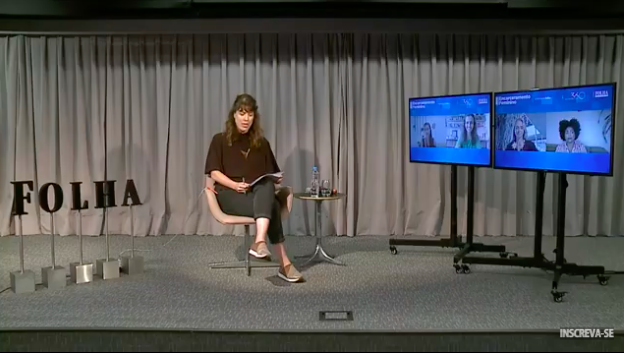On November 15, the Humanitas360 Institute released the documentary Tecendo a Liberdade (weaving freedom). The film tells the stories of struggle and overcoming of members of the COOSTAFE (Social Cooperative of Female Entrepreneurial Art Work) — the first female inmates cooperative of Brazil, formed in 2014 at the Ananindeua Women’s Reeducation Center (CRF) in Belém, Pará — and the Lili Cooperative, implemented by H360 in the II Women’s Penitentiary in Tremembé, São Paulo. As part of the film release, H360 and Folha de São Paulo newspaper held the Female Incarceration webinar. The debate was moderated by Folha’s special reporter Fernanda Mena and was attended by the movie’s director and screenwriter Luíza Matravolgyi, director of IDDD Marina Dias (who also gives her testimony in the film), Humanitas360 Institute president Patrícia Villela Marino and singer, actress and activist for the right to housing Preta Ferreira.
The conversation dealt with the reality of female incarceration, from the causes to the consequences it imposes to these women, their families and, therefore, the Brazilian society. In her addressing, Marina Dias mentioned the importance of bringing together women committed to transforming the prison reality and to breaking the cycle of violence that perpetuates and results in mass incarceration. “The incarceration of women is the last step in the sophistication of gender violence. This is revealed by the Judiciary, with its moralistic decisions, by police violence when they are arrested, by the abandonment of the family as they serve time,” she said.
Luíza said that finishing the documentary was a personal challenge, especially as she understood that these are stories that do not end with the film: “The history of cooperatives continues to happen, Humanitas360 continues to work on building cooperatives like the one in Maranhão. It was a decision to finish it so that we could spread this story around and communicate it to the public.” The director sees the film as an activism tool that encourages a debate on possible solutions to this issue.
For Patrícia Villela Marino, the film represents an effort by H360 to expose the social injustice and racial inequality we face in Brazil, as well as to establish bonds. As Patrícia says, “there is a need for bonds in order for us to become a human, reconciling society. This is what this documentary is about: the constitution of bonds between us, women prisoners, prison officers.”
Preta Ferreira, who spent 108 days in pre-trial detention, recalled the 500% increase in the number of women arrested in the past 10 years and the lack of public policies aimed at the most vulnerable populations. “We need to ask ourselves why these women are being arrested and what role society plays in that. How can we reintegrate those who were never integrated into society? We need to talk about necropolitics in a simple and accessible language,” said Preta. There is a scene in the film in which one of the imprisoned women is released. The sequence had a strong impact among the debate’s attendees. “I watched that scene about ten times. You have no idea what it is like to receive that freedom, to see those imprisoned women celebrating the departure of a colleague even though they know they will stay there,” she said.
The connection between the Drug Law and the wide incarceration of women due to the possession of drugs — many of them arrested with small quantities — was raised in the debate. In the past decade, the number of women in prison has increased by more than 500%. More than 75% of women prisoners committed nonviolent crimes, 64% were charged for drug trafficking, 63.5% of women prisoners in the country are black, almost half of them are under 29, 74% of them are mothers — most are mothers of more than one child.





